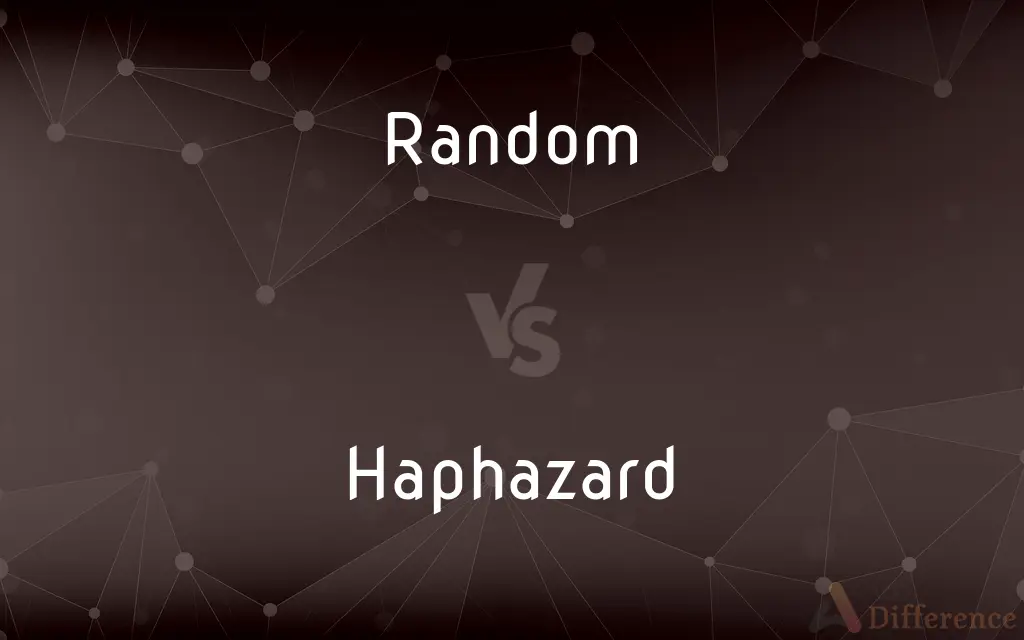Random vs. Haphazard — What's the Difference?
By Tayyaba Rehman & Fiza Rafique — Updated on April 20, 2024
"Random implies a lack of predictability and order, driven by chance, while haphazard suggests a more careless or unplanned randomness, often resulting in disorganization."

Difference Between Random and Haphazard
Table of Contents
ADVERTISEMENT
Key Differences
Random is typically used to describe an outcome or selection that lacks any predictable pattern or purpose, driven entirely by chance. Whereas, haphazard implies not only randomness but also a lack of care or planning, often resulting in disorganization or mess.
In scientific contexts, randomness is often quantifiable and essential for experiments requiring unbiased samples. On the other hand, haphazard approaches are generally frowned upon in scientific methodologies due to their chaotic and unplanned nature.
In everyday language, saying something happened randomly usually means it occurred without any discernible intention or cause. While, describing an action as haphazard often carries a negative connotation, suggesting negligence or disorder.
When organizing objects or data, a random arrangement might be intentionally used to ensure fairness or to test hypotheses under controlled variations. In contrast, a haphazard arrangement is rarely purposeful and typically results from carelessness or a lack of method.
In terms of outcomes, random processes can lead to a distribution of results that, over time, becomes predictable in its unpredictability, like the results of flipping a coin. Whereas, haphazard actions might lead to unpredictable and potentially harmful outcomes due to the absence of planning.
ADVERTISEMENT
Comparison Chart
Definition
Lacking any predictable order or plan, governed by chance
Marked by a lack of planning, leading to disorder and randomness
Context Usage
Scientific experiments, statistics
Describing messy or careless arrangements
Connotation
Neutral, often implies fairness through unpredictability
Generally negative, implies negligence
Planning
May be part of a controlled process
Indicates a lack of control or forethought
Predictability
Predictable in its statistical distribution
Unpredictable and often chaotic
Compare with Definitions
Random
Mathematics; of or characterized by a probability distribution.
Random sampling is crucial for statistical analysis.
Haphazard
Characterized by lack of order or planning, by irregularity, or by randomness; determined by or dependent on chance.
Their travel plans were rather haphazard.
Random
Governed by or involving equal chances for each item.
To ensure fairness, jury members were chosen at random.
Haphazard
Random with a negative connotation of carelessness.
The project's success was jeopardized by his haphazard approach.
Random
Lacking order, purpose, reason; determined by chance.
His random comments during meetings often confused new employees.
Haphazard
Done or happening in a confused or careless manner.
The decorations were put up in a haphazard fashion.
Random
Informal; unexpected and surprising.
She received a random text from an old friend.
Haphazard
Lacking any obvious principle of organization.
The files were left in a haphazard pile on the floor.
Random
Made, done, or happening without method or conscious decision.
The lottery numbers are selected at random.
Haphazard
Carelessly hurried.
His haphazard attempt to fix the leak only made things worse.
Random
Having no specific pattern, purpose, or objective
Random movements.
Haphazard
Dependent upon or characterized by mere chance.
Random
Mathematics & Statistics Of or relating to a type of circumstance or event that is described by a probability distribution.
Haphazard
Mere chance; fortuity.
Random
A roving motion; course without definite direction; lack of rule or method; chance.
Haphazard
By chance; casually.
Random
(obsolete) Speed, full speed; impetuosity, force.
Haphazard
Random; chaotic; incomplete; not thorough, constant, or consistent.
Do not make such haphazard changes to the settings; instead, adjust the knobs carefully, a bit at a time.
Random
(obsolete) The full range of a bullet or other projectile; hence, the angle at which a weapon is tilted to allow the greatest range.
Haphazard
Simple chance, a random accident, luck.
Random
An undefined, unknown or unimportant person; a person of no consequence.
The party was boring. It was full of randoms.
Haphazard
Extra hazard; chance; accident; random.
We take our principles at haphazard, upon trust.
Random
(mining) The direction of a rake-vein.
Haphazard
Determined by chance, whimsy, or guesswork; unplanned; aimless; random; - used mostly of human actions.
Random
A frame for composing type.
Haphazard
Dependent upon or characterized by chance;
A haphazard plan of action
His judgment is rather hit-or-miss
Random
Having unpredictable outcomes and, in the ideal case, all outcomes equally probable; resulting from such selection; lacking statistical correlation.
The flip of a fair coin is purely random.
The newspaper conducted a random sample of five hundred American teenagers.
The results of the field survey look random by several different measures.
Haphazard
Marked by great carelessness;
A most haphazard system of record keeping
Slapdash work
Slipshod spelling
Sloppy workmanship
Random
(mathematics) Of or relating to probability distribution.
A toss of loaded dice is still random, though biased.
Haphazard
Without care; in a slapdash manner;
The Prime Minister was wearing a gray suit and a white shirt with a soft collar, but his neck had become thinner and the collar stood away from it as if it had been bought haphazard
Random
(computing) Pseudorandom; mimicking the result of random selection.
Random
Representative and undistinguished; typical and average; selected for no particular reason.
A random American off the street couldn't tell the difference.
Random
Apropos of nothing; lacking context; unexpected; having apparent lack of plan, cause, or reason.
That was a completely random comment.
The teacher's bartending story was interesting, but random.
The narrative takes a random course.
Random
(colloquial) Characterized by or often saying random things; habitually using non sequiturs.
You're so random!
Random
Being out of the ordinary; unusual or unexpected.
That's a rather random fact!
Random
Force; violence.
For courageously the two kings newly fought with great random and force.
Random
A roving motion; course without definite direction; want of direction, rule, or method; hazard; chance; - commonly used in the phrase at random, that is, without a settled point of direction; at hazard.
Counsels, when they flyAt random, sometimes hit most happily.
O, many a shaft, at random sent,Finds mark the archer little meant!
Random
Distance to which a missile is cast; range; reach; as, the random of a rifle ball.
Random
The direction of a rake-vein.
Random
Going at random or by chance; done or made at hazard, or without settled direction, aim, or purpose; hazarded without previous calculation; left to chance; haphazard; as, a random guess.
Some random truths he can impart.
So sharp a spur to the lazy, and so strong a bridle to the random.
Random
Of, pertaining to, or resulting from a process of selection from a starting set of items, in which the probability of selecting any one object in the starting set is equal to the probability of selecting any other.
Random
Of unequal size or shape; made from components of unequal size or shape.
Random
Lacking any definite plan or order or purpose; governed by or depending on chance;
A random choice
Bombs fell at random
Random movements
Random
Taken haphazardly;
A random choice
Common Curiosities
How do randomness and haphazardness affect data analysis?
Randomness is crucial for unbiased sampling in data analysis, whereas haphazard methods can introduce errors and unreliability.
What is the main difference between random and haphazard?
Random refers to actions or events that occur without a predictable pattern, purely by chance, while haphazard implies randomness coupled with carelessness or disorganization.
Is haphazard always negative?
Generally, haphazard has a negative connotation as it suggests negligence or lack of care.
Can something be random but not haphazard?
Yes, random can be systematic and part of a planned process like random sampling in statistics, unlike haphazard, which is unplanned and often disorderly.
What is an example of a random process in nature?
Random processes in nature include genetic mutations, which occur without any predictable order and can influence evolution.
Is there a way to measure how haphazard a process is?
While "haphazard" is more qualitative and subjective, one might assess the level of disorganization or the lack of planning to determine how haphazard a process is.
Can haphazard methods ever be beneficial?
Rarely; while spontaneity can sometimes yield creative results, haphazard methods typically lead to inefficiency and errors.
Can the layout of a room be described as haphazard?
Yes, if the arrangement of furniture and decorations appears to lack any coherent plan or order, it can be described as haphazard.
Why is randomness important in designing experiments?
Randomness in experimental design, such as in random assignment of subjects to different groups, is crucial to ensure that the results are unbiased and representative of the general population.
How do randomness and haphazardness relate to reliability in results?
Randomness, when controlled and intentional, can enhance the reliability of results by eliminating bias, whereas haphazard approaches generally reduce reliability due to their inherent disorder and unpredictability.
Share Your Discovery

Previous Comparison
Trustful vs. Trusty
Next Comparison
Divide vs. UniteAuthor Spotlight
Written by
Tayyaba RehmanTayyaba Rehman is a distinguished writer, currently serving as a primary contributor to askdifference.com. As a researcher in semantics and etymology, Tayyaba's passion for the complexity of languages and their distinctions has found a perfect home on the platform. Tayyaba delves into the intricacies of language, distinguishing between commonly confused words and phrases, thereby providing clarity for readers worldwide.
Co-written by
Fiza RafiqueFiza Rafique is a skilled content writer at AskDifference.com, where she meticulously refines and enhances written pieces. Drawing from her vast editorial expertise, Fiza ensures clarity, accuracy, and precision in every article. Passionate about language, she continually seeks to elevate the quality of content for readers worldwide.
















































